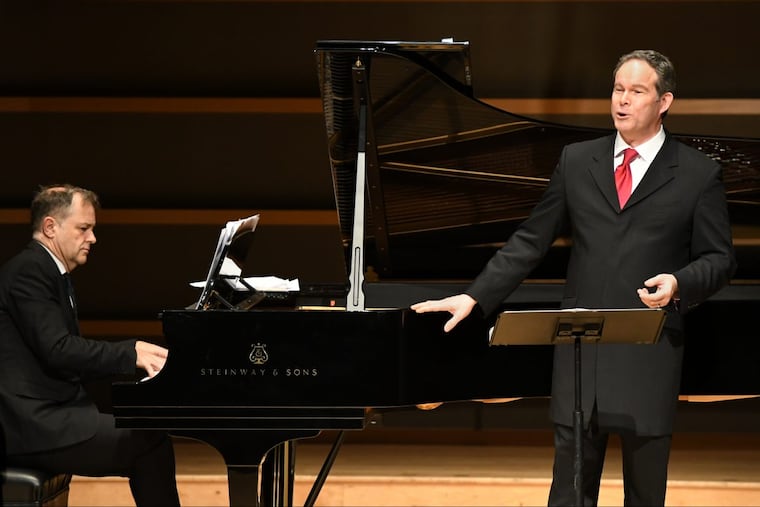Partnership of equals: pianist Julius Drake and bass-baritone Gerald Finley
The pair presented Schubert, Beethoven, Tchaikovsky and Rachmaninoff at the Kimmel.

They used to be called accompanists, a term both misleading and dismissive. But if the pianist in a Beethoven violin sonata or Schubert song has now come to be recognized as a full partner, it is because of Julius Drake and musicians like him.
Friday night's Philadelphia Chamber Music Society recital at the Perelman Theater by the Canadian bass-baritone Gerald Finley could have been just fine with any number of pianists. It was Drake, though, who was at the keyboard, and his personality glows. In a group of Rachmaninoff songs, he was the propelling force, unfurling harmonic tension in waves. In quiet Beethoven, a string of single notes telegraphed the song's emotional truth.
Every musical decision he made flowed from the text of a song. In Schubert's "An den Mond" ("To the Moon"), he made the music glide like the river in Goethe's poem, and for "An Schwager Kronos" ("To Coachman Kronos") he emphasized the sense of journey that ends in the arms of Orcus, god of the underworld. He gave the same composer's "Prometheus" Wagnerian grandeur.
But nothing Drake does outshines Finley. In fact, ideas raised by one were built upon by the other Friday night in this recital of classical-era Beethoven and Schubert in the first half, and Romantic-era Tchaikovsky and Rachmaninoff on the second (ending with folk songs). In that quiet Beethoven, where Drake's single notes were as jewels, Finley managed a tender whisper. He characterized several distinct vocal personalities in a single piece – Beethoven's "From Goethe's Faust," with a deeply devilish sound from the most resonant part of his voice, and subtle expressive connective tissue between notes that put drama behind the tale.
Finley was strong in the Russians – works like Tchaikovsky's "At the Ball" and Rachmaninoff's "Fate," though his sound is not as well suited for this repertoire as it is for Schubert and Beethoven. The sheer beauty of the voice revealed itself most thrillingly in Schubert's "Geistes-Gruss" ("Ghost Greetings"). The most hair-raising aspects of the "Erlkönig" are, of course, the piece itself, though Finley and Drake turned up the drama to highly satisfying ends.
Storytelling considerably lighter came in the form of Britten's "The Crocodile," and you had to appreciate the way this pair told the audience it was time to go. Britten's "Bird Scarer Song" lasts all of about a minute. Terse, it ends with a "shoo" and a "Ha!" The audience obeyed.